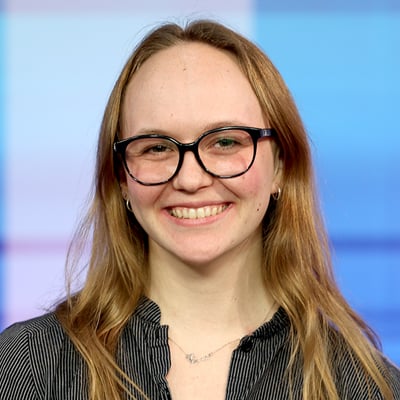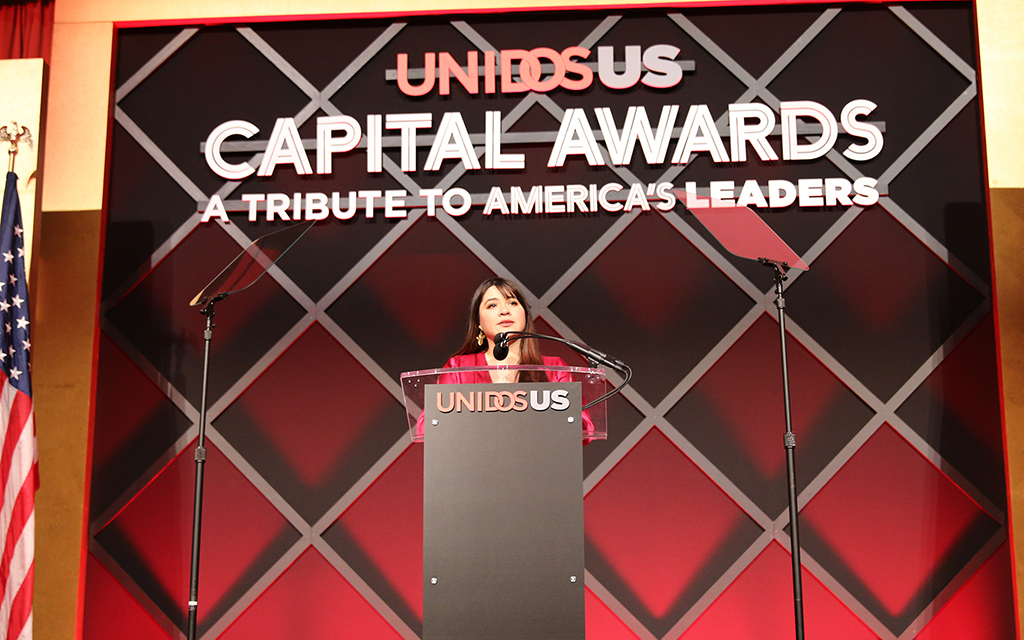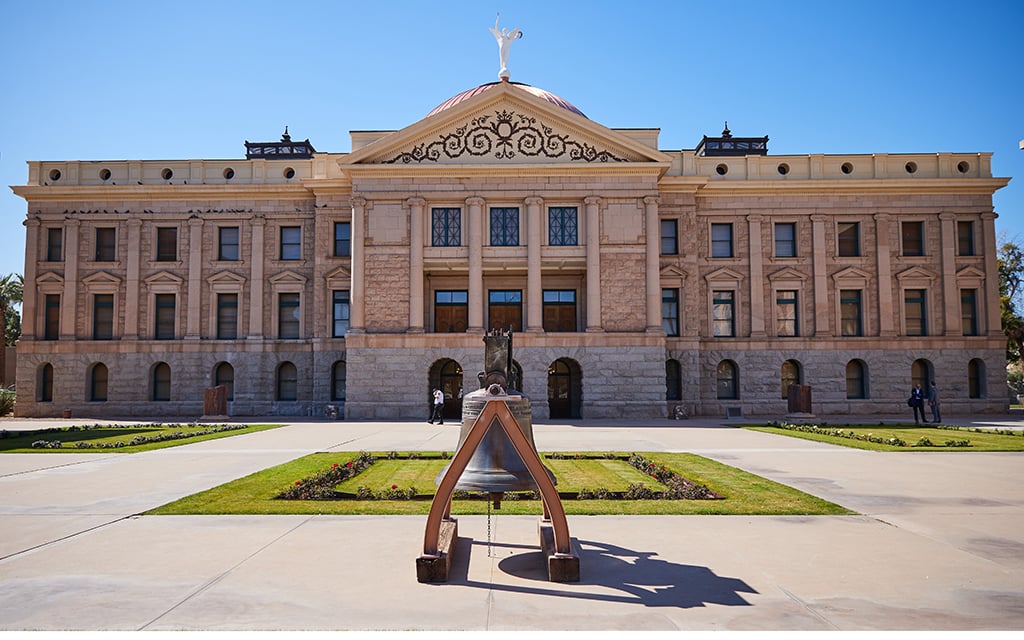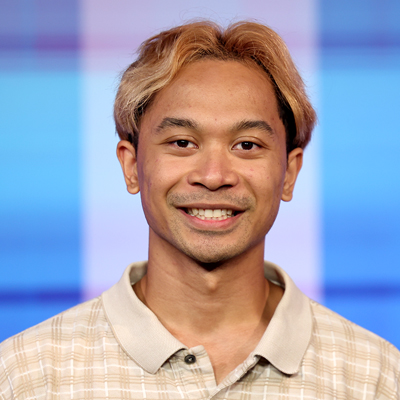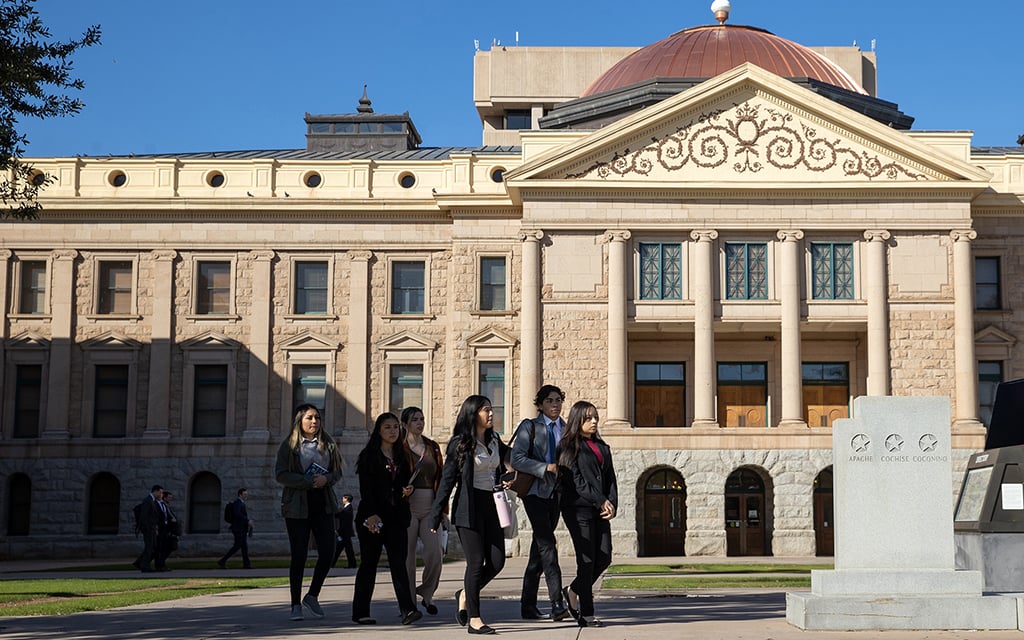
Students go between the Arizona House and Senate for meetings with state legislators on Feb. 15, 2023. (Photo by Drake Presto/Cronkite News)
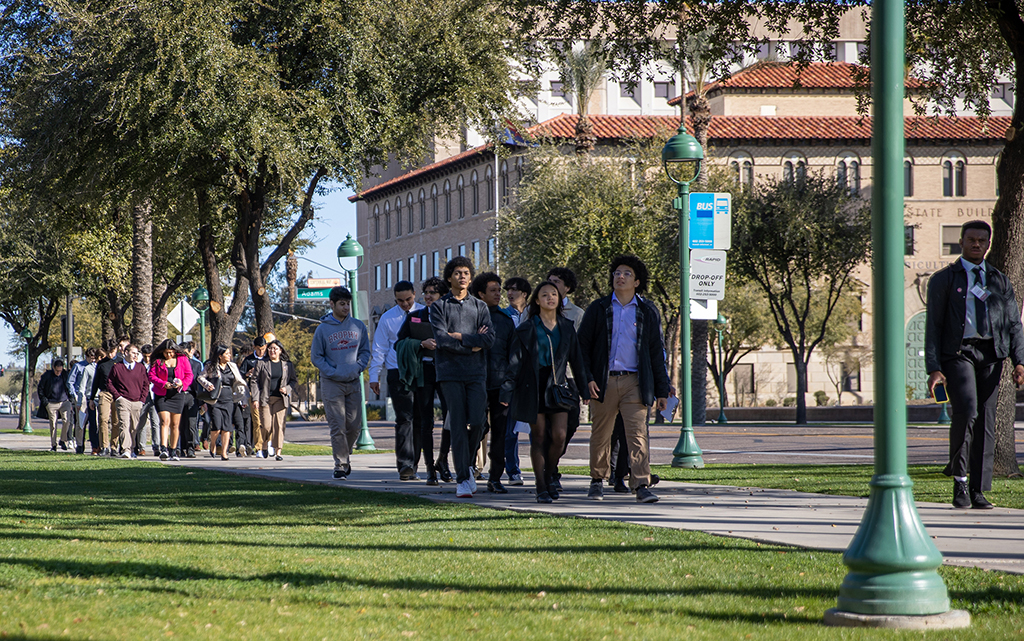
Students from around the Valley arrive by bus to the Capitol for Aliento’s Education Day on Feb. 15, 2023, in Phoenix. The event allows students, educators and other community advocates to talk with legislators about the organization’s policy priorities. (Photo by Drake Presto/Cronkite News)
PHOENIX — Miah Gomez, senior class president at Mesa High School, comes from a mixed-status family — one of her parents is undocumented, but Gomez was born in the United States. She’s always cared about immigration laws because of her family, her friends and her school peers.
Gomez is a fellow at Aliento, a youth-led education nonprofit serving undocumented young people, recipients of Deferred Action for Childhood Arrivals and members of mixed-status families. On Wednesday, she was one of about 150 students at the Arizona State Capitol conducting 40 meetings with elected officials during Aliento’s Education Day.
“I think these annual days go a long way,” Gomez said. “Making sure that we’re really, really being heard and sitting down with legislators. That’s not going to stop until we see progress.”
Aliento worked for years leading up to the 2022 midterm election to help get Proposition 308 — granting in-state tuition to qualifying undocumented students — on the ballot, where it was approved by voters in November.
This year’s policy priorities include advocating for the Promise for Dreamers Scholarship Program, access to occupational licenses for “Dreamers” — undocumented residents who were brought to the U.S. as children — and repeal of Proposition 203 that curtails bilingual education in public schools. They also include increasing funding for mental health initiatives and paving pathways for undocumented people to obtain driver’s licenses.
The students’ focus throughout the day was on the impact of their personal stories, not politics. In a brief training session held at Brophy College Preparatory before visiting the Capitol, the group was instructed to stay nonpartisan and to strike a tone of casual, but empowered, confident conversation.
“Oftentimes, storytelling is what will be the most effective in changing somebody’s opinion or heart or mind,” said Gomez, who has moved around Arizona since she was a kid. Mesa High School is the first school she’s gone to for four consecutive years, and it’s one of the only school communities where she said she’s felt included, cared for and part of a like-minded group.
“I’ve really not only cared for my community, but I got to experience (at Mesa High School) what actively caring for a community that you’re genuinely a part of was,” she said.
Last year at Education Day, Gomez was a storyteller, personally explaining her and her father’s experiences with immigration, including financial roadblocks to higher education addressed by Proposition 308.
This year, Gomez acted as a caretaker, making sure student speakers and other attendees were in the right headspace to talk about their personal life and the way policy impacts them, their families and their friends.
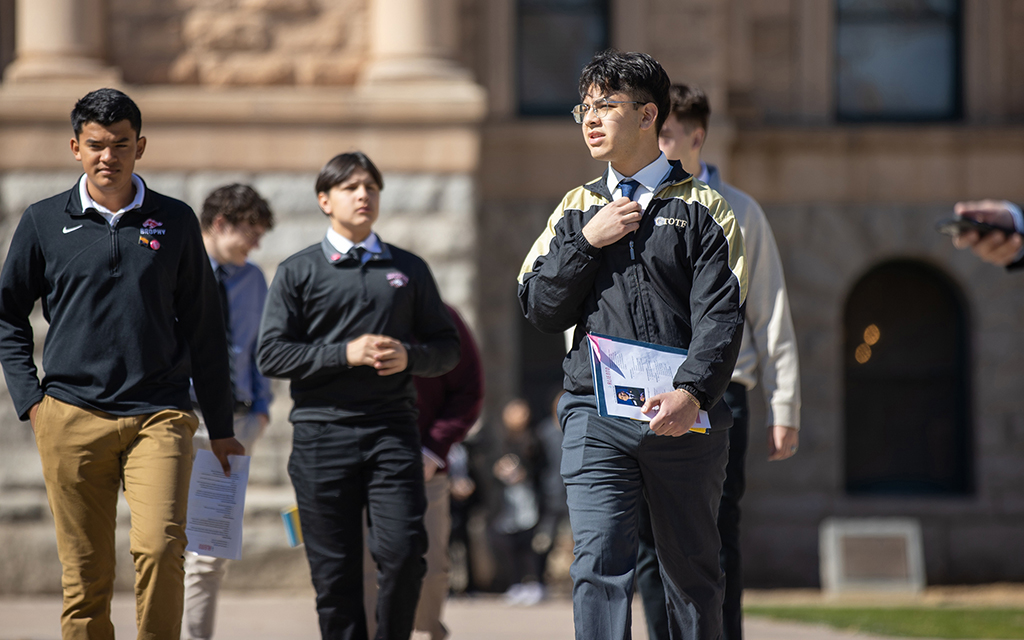
Daniel Martinez Romero, a senior at Brophy College Preparatory, leads a group of students at Aliento’s Education Day at the Capitol on Feb. 15, 2023, in Phoenix. (Photo by Drake Presto/Cronkite News)
Education Day began in 2019, when more than 230 students, teachers and other advocates came to the Capitol to talk about tuition access for high school graduates, no matter their immigration status.
“While people may have fancy titles and basically live and work in these buildings (at the Capitol), they’re also human beings, and they want to hear from the community,” said José Patiño, Aliento’s vice president of education and external affairs. “Change happens when a community specifically cares about an issue and is able to advocate for it. It takes time.”
Daniel Martinez Romero, a senior at Brophy who is part of the school’s Romero Program doing an internship with Aliento, said meeting with legislators and gauging their priorities while in conversation is the first step in later holding them accountable.
“Despite us being from different schools, there’s a unifying force, which is our age,” Martinez Romero said. “We’re all students, so that’s a factor. … There’s a lot of passion, and the students all have their own stories.”
On Wednesday, the students, including Betsy Arcos, a Mesa High School junior and Aliento fellow, met with Gov. Katie Hobbs, who they said was receptive to their messaging. The students said Hobbs was asking personal questions of the students, asking about their motivations and important aspects of their community.
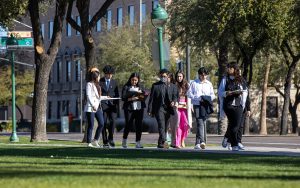
Students arrive at the Arizona Capitol to talk about multiple issues with legislators on Feb. 15, 2023. Some issues discussed include securing funding for the Arizona Promise Program for DACA students and driver’s licenses for undocumented students. (Photo by Drake Presto/Cronkite News)
In talking to Hobbs, students focused on the Promise for Dreamers Scholarship Program, which would allocate $40 million in scholarships for undocumented students, benefiting as many as 3,000 students across the state. First announced in her State of the State Address, Hobbs said the aid is an extension of Proposition 308, passed by 51% of Arizona voters last year and allowing non-citizen high school graduates to receive in-state tuition.
“The Governor was thrilled to have Dreamers here in the Governor’s office and was deeply moved by their stories,” Hobbs’ spokesperson Josselyn Berry said in a statement after the meeting with students. “It’s important to us that they feel heard and seen by our administration.”
Patiño said students met with mostly Democrats and moderate Republicans Wednesday. Meetings with legislators were scheduled for the students ahead of Education Day, making sure students were meeting with policymakers who represent their legislative district.
“I would have liked for them (legislators who could not or did want to meet with Aliento) to just take a step back and look at the humanity,” said Karen Velazquez, an undergraduate at Grand Canyon University studying government with an emphasis on legal studies alongside forensic psychology. “We’re all humans. We all have difficulties that we endure. And I would just like for them to take a step back and listen to our stories.”
Patiño said a few of the meetings with legislators ran short, some ran long and others were rescheduled or canceled last minute, “but all of us are here, and we’re talking about issues that we care about, so I would consider that a win,” he said.
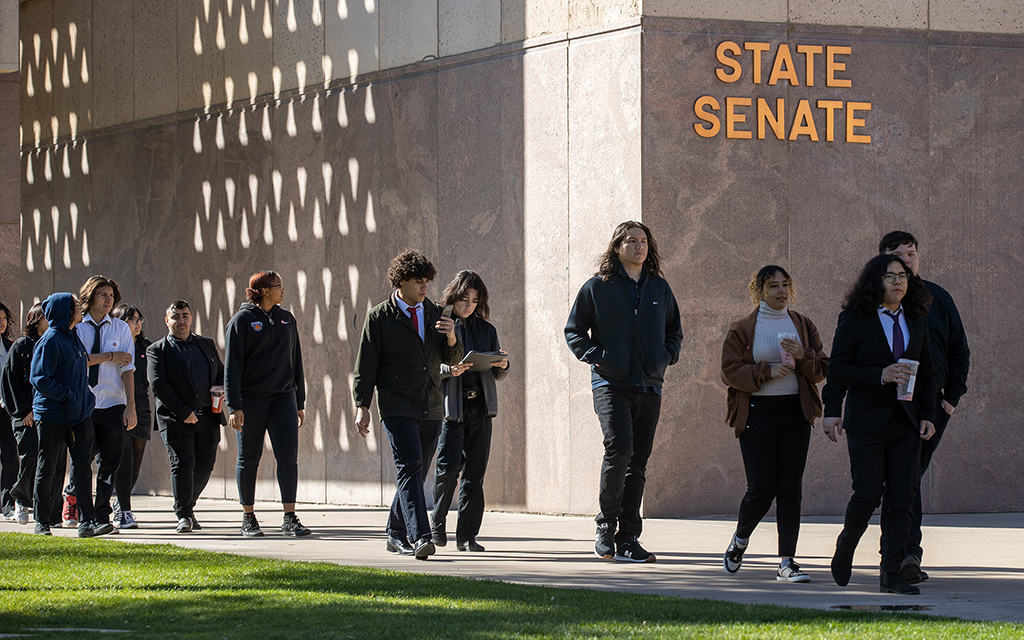
Students walk to a meeting with state legislators on Feb. 15, 2023. Aliento, a youth-led education nonprofit serving undocumented young people, DACA recipients and members of mixed-status families, trains the students to help them concisely explain their legislative priorities. (Photo by Drake Presto/Cronkite News)
“At the end of the day, we want to bring it back to that human aspect,” Martinez Romero said.
After hearing from students Wednesday morning, including from one who told a story about his uncle being deported, Rep. Patty Contreras, D-Phoenix, said that as someone from a migrant community who is bilingual, she related to a lot of the personal experiences of the students.
All students have the same basic needs, Contreras said, making a point to call out that more is needed in supporting student mental health. “They need to be supported. They need to have health care, mental health care” and a funded school system with teachers who are trained.
Lizbeth Alfaro Espinoza, an undergraduate at Arizona State University completing coursework in justice and transborder studies as well as Latino politics and policy, has been to every Education Day since 2019.
“It’s such an empowering moment,” Alfaro Espinoza said. “You see a community come together at the state Capitol — people from different ages, from different schools across Arizona coming together and educating legislators, spreading awareness about these issues. It just shows there’s so much hope within the future.”
The students walked away from the Capitol Wednesday with a stronger sense of community tied to knowing other young people who use English as their second language, or knowing someone who is undocumented and wants to see even more support offered to future generations.
Education Day “introduced me to some of the most ambitious and incredible young people,” said Arcos, who is the Aliento fellow and one of the students who spoke with Hobbs. “It’s motivating, having a community that’s all rallied around being able to talk about these issues that impact us. Even if you yourself are not personally impacted, you can go out and try to help others who might be struggling with what certain policies might entail for us.”
